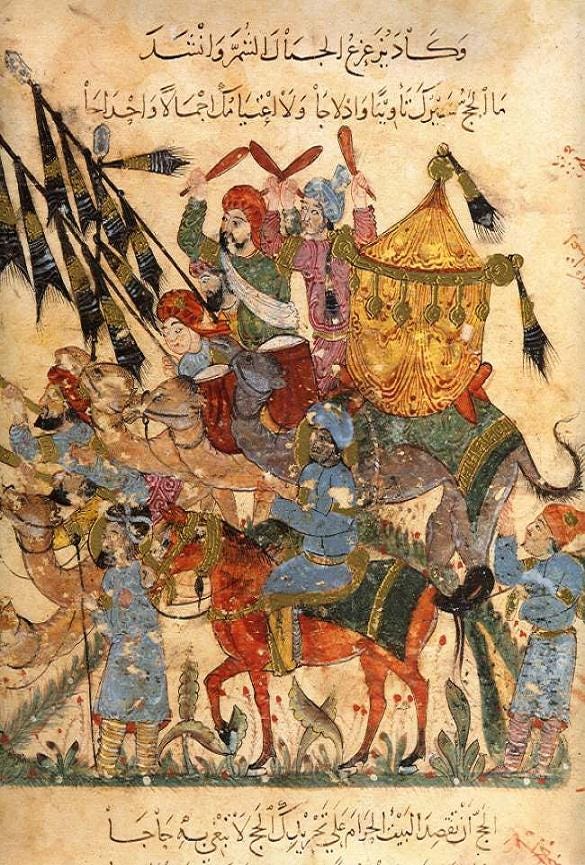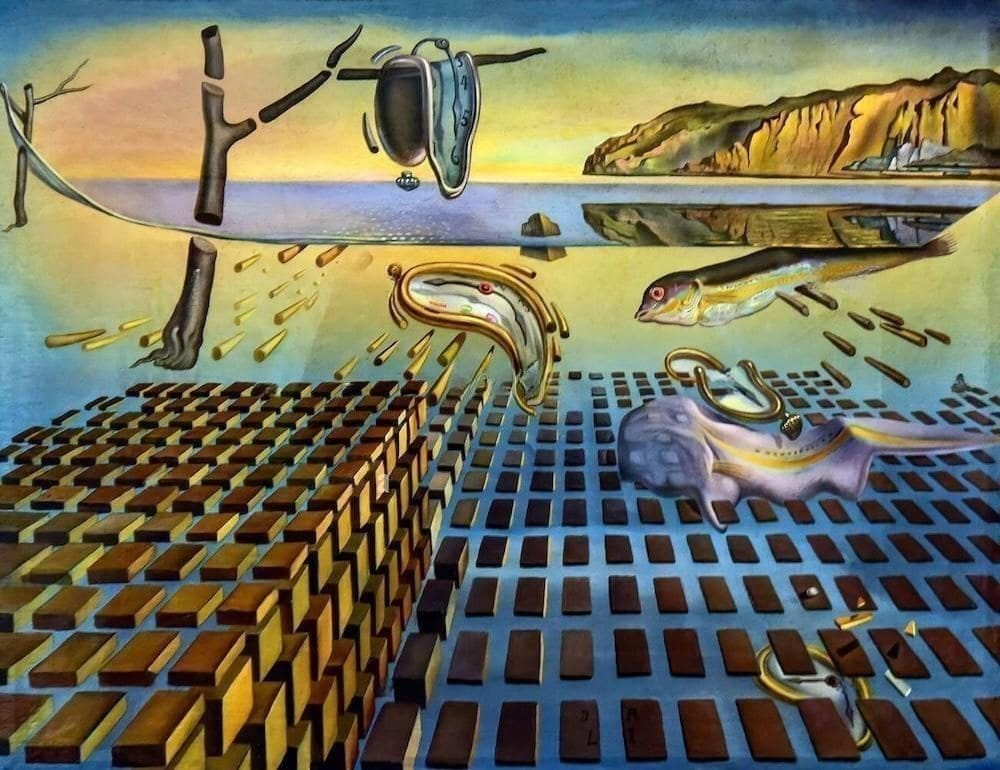The myth of universal stories
On essays as cultural crash courses—and the footnotes I refuse to erase
In David Foster Wallace’s 2005 address to the graduating class of Kenyon College, he started with a fable about two young fish1.
There are these two young fish swimming along, and they happen to meet an older fish swimming the other way, who nods at them and says, “Morning, boys. How’s the water?” And the two young fish swim on for a bit, and then eventually one of them looks over at the other and goes, “What the hell is water?”
I’ve been struggling with an essay for about 6 weeks now, an essay that seemed so clear and so fully formed when I first thought of it. And yet each time I have attempted to write it, it comes out a jumbled mess.
Maybe it’s the fact that for 4 of those 6 weeks, I’ve abstained from eating and drinking during daylight hours. Maybe it’s existential dread brought on by, well, everything.
Great excuses, except I think it’s something else.
My essay depends on my readers understanding something, or several somethings, in Islamic culture. It depends on a working context that doesn’t exist for most of them.
Before I ever get to the crux of my story, I have to spend ages on exposition. By which point the magic fades, and I am writing what feels like a sociology textbook instead.
I have saved draft after draft of the same piece, each time amputating a different footnote, a different ‘too much’ explanation, a favourite hadeeth—as if this is the price of subtlety.
I am a writer who doesn’t get googly-eyed over craft work. Who doesn’t sit down to tell a story and think “this will be a lyric essay, this will rely heavily on imagery.”
In the writing classes of my youth, I considered this a personal failing. My inability to show, not tell. My lack of subtlety. My paragraphs of lead-in to the main idea.
Writing about CanLit and double-consciousness last year, I described my problem in relation to the work of a rightly celebrated Canadian novelist:
“I fell down a Jane Urquhart rabbit hole, reading everything of hers I could get my hands on…
I read Urquhart with equal parts fascination and dismay. This was what CanLit sounded like, I was certain. But try as I might to emulate it, my heavily researched stories about old artists living in small northern towns fell apart as quickly as I could get them down. Where Urquhart mesmerized with subtlety and minimal action, my imitations did nothing but make me bored and sleepy.”
My classmates, meanwhile, could put out the most gorgeous poetry, building MFA-worthy portfolios that read like they belonged in the same journals that sent me only rejection letters.
It wasn’t until years later, at a workshop by Indigenous novelist
that I was first confronted with the idea of decolonizing creative writing. Waub shared with us an incredible essay that never left me by author Janice Pariat.The essay, from the Indian magazine Scroll, came out swinging with the statement that “the universal rules of “good” or “bad” writing are turning out to be colonial relics.”2
My initial reaction was to recoil. The universal rules of writing were universal by definition, after all. And I had spent so long twisting my words—and failing to twist my words, and shaming myself for failing to twist my words—into the shape my teachers requested, that the mere suggestion being made was sacrilege.
This. This ‘universal’ tenet of good writing I couldn’t embody, this was my literary water.

I bookmarked the essay, maybe out of perverse fascination. A week after the course, I went back to it, shaking my head as I read until I got to a paragraph that felt so painfully familiar, I knew it to be my truth.
Pariat writes of the famous show, don’t tell rule:
“this rule, as with others touted by the literary establishment (mostly of the white, male, privileged kind), worked under the assumption that their experience was “universal.” The power to show, not tell… stemmed from writing for an audience that shared so many assumptions with them that readers would feel that those settings and stories were “universal” and familiar to all.”
But whose stories are universal? Whose stories are so familiar they don’t need paragraphs of exposition just to set the scene? Whose background is the default upon which all others are exceptions to be explained and justified?
If I ignore my context, if I assume a shared cultural shorthand to match some mythical universal experience, it’s not my story anymore.
I want to give readers the gift of another backdrop against which to see the world. And so I will continue to struggle with my stubborn essay and every essay after it. I will keep writing explanations. If the price of being understood is a few more paragraphs, let them come.
It’s me or highly inaccurate, often Islamophobic talking heads. And I’d rather it’s me.
Thank you for reading Letters from a Muslim Woman. I’m so glad you’re here! If you’re enjoying my perspective and want to support me, upgrade to unlock the personal stuff, including my exclusive unfinished letters series, published twice a month.
If you can’t commit to a monthly subscription, but still want to support my work, you can buy me a coffee below. The caffeine and creativity fuel the writing in equal parts 😅.
Let’s chat in the comments:
Do you struggle with setting the “context”?
What is “good” writing to you? Does it have to follow MFA rules?
Do you read the essays in this newsletter for the deep-dives or are you more interested in the stuff that doesn’t take a textbook’s worth of background to understand? I’ll probably still write the textbooks (ha!) but I’d love to know.
https://www.newyorker.com/books/page-turner/this-is-water
https://scroll.in/article/999215/decolonising-creative-writing-its-about-not-conforming-to-techniques-of-the-western-canon - read the whole essay here. It will blow your mind!







Oh Noha, I LOVE what you are bringing up here and I will continue to read your essays that include footnotes and those that don't! Also, I giggled because I had to go and look up "A.H." from the caption of your beautiful illustration (and I am sorry I didn't know yet what it meant, but I do now!). The giggle came because, right then, I was being one of those readers who goes and looks up the thing (I read your footnotes regularly, too). I'm happy to be learning new things from you, AND I feel your lament that you have to footnote your writing. That feeling you described, of being so excited about your essay idea but then trying to add layer and layer of explanation till it's not fun anymore, I get that, too. While I often feel like I'm having to give backstory to anything I write and I feel resonance with you there, I know it's not the same as what you're experiencing because I come from the Greek-Roman-European colonizer's "shared context". And I see how I have benefited from that - lyric references, the authors one builds on, the myths and religious references. This seems so eye-opening and necessary to see! So I see and acknowledge the difficulty you feel, and I appreciate that you continue to share. I'm already curious to read the essay you're working on and I hope you'll write it at least once exactly how YOU want to write it, as if we all shared your context! Because being human ISN'T the same experience for everyone, and what you can show from your world might teach me something about how to live in mine. Thank you and may your writing fill YOUR heart as much or more than anyone else's!
Noha, thank you so much for this thought-provoking and powerful reflection! I'd never stopped to consider the colonial dynamics behind creative writing and am now rushing off to Scroll to find that essay by Janice Pariat. Your writing is always a treat, and whether you're showing or telling I'm here for it!